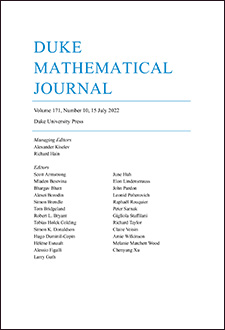Abstract
Consider a polynomial function f : ℂn→ℂ with generic fiber F. Let Bf be the bifurcation set of f; hence f induces a smooth locally trivial fibration over ℂ\Bf. Then, for any integer q≥0 and any coefficient ring R, there is an associated monodromy representation
$\rho(f)_q : \pi_1(\mathbb {C}\backslash B_f,{\rm pt})\to {\rm Aut}(\tilde {H}_q(F,R))$
in (reduced) homology. Going around a circle in ℂ large enough to contain all of the bifurcation set gives rise to the monodromy operators at infinity, which we denote by M∞(f)q.
We show that these monodromy operators at infinity and a certain natural direct sum decomposition of the homology of F in terms of vanishing cycles determine the monodromy representation. The role played by this decomposition is crucial since there are examples of polynomials ℂ2→ℂ having distinct complex monodromy representations but whose monodromy operators at infinity have the same Jordan normal form.
Citation
Alexandru Dimca. András Némethi. "On the monodromy of complex polynomials." Duke Math. J. 108 (2) 199 - 209, 1 June 2001. https://doi.org/10.1215/S0012-7094-01-10821-1
Information





